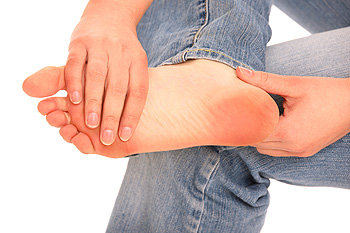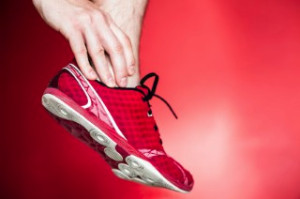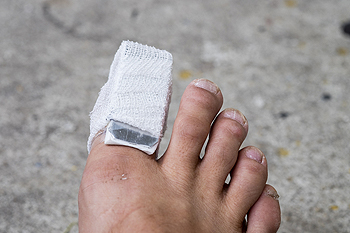Items filtered by date: March 2019
Understanding Your Foot Pain
 Foot pain is a broad term that covers many different types of pain. The foot is a complex part of the body that is comprised of many bones, ligaments and muscles; therefore, pain can be felt in various parts of the feet. The degree of pain or discomfort felt can highly differ. Pain can present itself as throbbing, aching, stabbing, or mild tenderness. Understanding and learning about your foot pain is key in figuring out what the underlying issue is. Some of the most common foot conditions that cause pain are plantar fasciitis, tarsal tunnel syndrome, metatarsalgia, Morton's neuroma, and Achilles tendinitis. All of these conditions cause pain in different locations and result in different types of pain. If you are experiencing any foot pain, speak with a podiatrist who can properly diagnose and treat the ailment.
Foot pain is a broad term that covers many different types of pain. The foot is a complex part of the body that is comprised of many bones, ligaments and muscles; therefore, pain can be felt in various parts of the feet. The degree of pain or discomfort felt can highly differ. Pain can present itself as throbbing, aching, stabbing, or mild tenderness. Understanding and learning about your foot pain is key in figuring out what the underlying issue is. Some of the most common foot conditions that cause pain are plantar fasciitis, tarsal tunnel syndrome, metatarsalgia, Morton's neuroma, and Achilles tendinitis. All of these conditions cause pain in different locations and result in different types of pain. If you are experiencing any foot pain, speak with a podiatrist who can properly diagnose and treat the ailment.
Foot Pain
Foot pain can be extremely painful and debilitating. If you have a foot pain, consult with Dr. Thomas E. Silver from Westwood Foot Clinic. Our doctor will assess your condition and provide you with quality foot and ankle treatment.
Causes
Foot pain is a very broad condition that could be caused by one or more ailments. The most common include:
- Bunions
- Hammertoes
- Plantar Fasciitis
- Bone Spurs
- Corns
- Tarsal Tunnel Syndrome
- Ingrown Toenails
- Arthritis (such as Gout, Rheumatoid, and Osteoarthritis)
- Flat Feet
- Injury (from stress fractures, broken toe, foot, ankle, Achilles tendon ruptures, and sprains)
- And more
Diagnosis
To figure out the cause of foot pain, podiatrists utilize several different methods. This can range from simple visual inspections and sensation tests to X-rays and MRI scans. Prior medical history, family medical history, and any recent physical traumatic events will all be taken into consideration for a proper diagnosis.
Treatment
Treatment depends upon the cause of the foot pain. Whether it is resting, staying off the foot, or having surgery; podiatrists have a number of treatment options available for foot pain.
If you have any questions, please feel free to contact our office located in Golden Valley, MN . We offer the newest diagnostic and treatment technologies for all your foot care needs.
Read more about Foot PainUnderstanding Your Foot Pain
 Foot pain is a broad term that covers many different types of pain. The foot is a complex part of the body that is comprised of many bones, ligaments and muscles; therefore, pain can be felt in various parts of the feet. The degree of pain or discomfort felt can highly differ. Pain can present itself as throbbing, aching, stabbing, or mild tenderness. Understanding and learning about your foot pain is key in figuring out what the underlying issue is. Some of the most common foot conditions that cause pain are plantar fasciitis, tarsal tunnel syndrome, metatarsalgia, Morton's neuroma, and Achilles tendinitis. All of these conditions cause pain in different locations and result in different types of pain. If you are experiencing any foot pain, speak with a podiatrist who can properly diagnose and treat the ailment.
Foot pain is a broad term that covers many different types of pain. The foot is a complex part of the body that is comprised of many bones, ligaments and muscles; therefore, pain can be felt in various parts of the feet. The degree of pain or discomfort felt can highly differ. Pain can present itself as throbbing, aching, stabbing, or mild tenderness. Understanding and learning about your foot pain is key in figuring out what the underlying issue is. Some of the most common foot conditions that cause pain are plantar fasciitis, tarsal tunnel syndrome, metatarsalgia, Morton's neuroma, and Achilles tendinitis. All of these conditions cause pain in different locations and result in different types of pain. If you are experiencing any foot pain, speak with a podiatrist who can properly diagnose and treat the ailment.
Foot Pain
Foot pain can be extremely painful and debilitating. If you have a foot pain, consult with Dr. Thomas E. Silver from Westwood Foot Clinic. Our doctor will assess your condition and provide you with quality foot and ankle treatment.
Causes
Foot pain is a very broad condition that could be caused by one or more ailments. The most common include:
- Bunions
- Hammertoes
- Plantar Fasciitis
- Bone Spurs
- Corns
- Tarsal Tunnel Syndrome
- Ingrown Toenails
- Arthritis (such as Gout, Rheumatoid, and Osteoarthritis)
- Flat Feet
- Injury (from stress fractures, broken toe, foot, ankle, Achilles tendon ruptures, and sprains)
- And more
Diagnosis
To figure out the cause of foot pain, podiatrists utilize several different methods. This can range from simple visual inspections and sensation tests to X-rays and MRI scans. Prior medical history, family medical history, and any recent physical traumatic events will all be taken into consideration for a proper diagnosis.
Treatment
Treatment depends upon the cause of the foot pain. Whether it is resting, staying off the foot, or having surgery; podiatrists have a number of treatment options available for foot pain.
If you have any questions, please feel free to contact our office located in Golden Valley, MN . We offer the newest diagnostic and treatment technologies for all your foot care needs.
Wounds That Don't Heal Need to Be Checked
Wounds That Don't Heal Need to Be Checked
Choosing the Right Shoe for Different Running Styles
 Research has shown the importance of wearing the correct running shoes that are appropriate for your style of running. Once the proper shoe size is determined, it may be beneficial to consider what type of running will be practiced. Trying shoes on later in the day when the feet are at their largest may help to ensure a proper fit. Additionally, the heel of the shoe should be solid, and this may help to provide stability to the feet and ankles. It may be beneficial to alternate between two pair of shoes, in addition to considering purchasing new shoes approximately five hundred miles. If you would like additional information about how to choose running shoes that are correct for you, please consult with a podiatrist who can properly guide you.
Research has shown the importance of wearing the correct running shoes that are appropriate for your style of running. Once the proper shoe size is determined, it may be beneficial to consider what type of running will be practiced. Trying shoes on later in the day when the feet are at their largest may help to ensure a proper fit. Additionally, the heel of the shoe should be solid, and this may help to provide stability to the feet and ankles. It may be beneficial to alternate between two pair of shoes, in addition to considering purchasing new shoes approximately five hundred miles. If you would like additional information about how to choose running shoes that are correct for you, please consult with a podiatrist who can properly guide you.
If you are a runner, wearing the right running shoe is essential. For more information, contact Dr. Thomas E. Silver from Westwood Foot Clinic. Our doctor can provide the care you need to keep you pain-free and on your feet.
Choosing the Right Running Shoe for Your Foot Type
To increase performance and avoid the risk of injury, it is important to choose the right running shoe based on your foot type. The general design of running shoes revolves around pronation, which is how the ankle rolls from outside to inside when the foot strikes the ground.
- Neutral runners are able to choose from a wide variety of shoes, including minimalist shoes or even going barefoot.
- Runners who overpronate, or experience an over-abundance of ankle rolling, should choose shoes that provide extra motion control and stability.
- Runners who underpronate, or supinate, have feet that have high arches and lack flexibility, preventing shock absorption. They require shoes with more flexibility and cushion.
If you have any questions please feel free to contact our office located in Golden Valley, MN . We offer the newest diagnostic and treatment technologies for all your foot and ankle needs.
Read more about Choosing the Right Running Shoe for Your Foot TypeChoosing the Right Shoe for Different Running Styles
 Research has shown the importance of wearing the correct running shoes that are appropriate for your style of running. Once the proper shoe size is determined, it may be beneficial to consider what type of running will be practiced. Trying shoes on later in the day when the feet are at their largest may help to ensure a proper fit. Additionally, the heel of the shoe should be solid, and this may help to provide stability to the feet and ankles. It may be beneficial to alternate between two pair of shoes, in addition to considering purchasing new shoes approximately five hundred miles. If you would like additional information about how to choose running shoes that are correct for you, please consult with a podiatrist who can properly guide you.
Research has shown the importance of wearing the correct running shoes that are appropriate for your style of running. Once the proper shoe size is determined, it may be beneficial to consider what type of running will be practiced. Trying shoes on later in the day when the feet are at their largest may help to ensure a proper fit. Additionally, the heel of the shoe should be solid, and this may help to provide stability to the feet and ankles. It may be beneficial to alternate between two pair of shoes, in addition to considering purchasing new shoes approximately five hundred miles. If you would like additional information about how to choose running shoes that are correct for you, please consult with a podiatrist who can properly guide you.
If you are a runner, wearing the right running shoe is essential. For more information, contact Dr. Thomas E. Silver from Westwood Foot Clinic. Our doctor can provide the care you need to keep you pain-free and on your feet.
Choosing the Right Running Shoe for Your Foot Type
To increase performance and avoid the risk of injury, it is important to choose the right running shoe based on your foot type. The general design of running shoes revolves around pronation, which is how the ankle rolls from outside to inside when the foot strikes the ground.
- Neutral runners are able to choose from a wide variety of shoes, including minimalist shoes or even going barefoot.
- Runners who overpronate, or experience an over-abundance of ankle rolling, should choose shoes that provide extra motion control and stability.
- Runners who underpronate, or supinate, have feet that have high arches and lack flexibility, preventing shock absorption. They require shoes with more flexibility and cushion.
If you have any questions please feel free to contact our office located in Golden Valley, MN . We offer the newest diagnostic and treatment technologies for all your foot and ankle needs.
Signs of a Broken Toe
 Most people have dealt with a stubbed toe, which can cause an immediate sharp pain. In most cases, this initial pain fades quickly. If the pain persists, however, this could be a sign of something serious. The pain associated with hitting your toe feels intense because there are many nerve receptors in your toes that are impacted by blunt force. If the toe is hit too hard, then this may cause a break or fracture, which will require medical attention. If you are unable to put weight on the toe or if walking causes discomfort, this could be a sign that your toe is broken. If you think you may have broken your toe or injured it severely, then it is highly recommended you speak with a podiatrist in order to learn about treatment options.
Most people have dealt with a stubbed toe, which can cause an immediate sharp pain. In most cases, this initial pain fades quickly. If the pain persists, however, this could be a sign of something serious. The pain associated with hitting your toe feels intense because there are many nerve receptors in your toes that are impacted by blunt force. If the toe is hit too hard, then this may cause a break or fracture, which will require medical attention. If you are unable to put weight on the toe or if walking causes discomfort, this could be a sign that your toe is broken. If you think you may have broken your toe or injured it severely, then it is highly recommended you speak with a podiatrist in order to learn about treatment options.
A broken toe can be very painful and lead to complications if not properly fixed. If you have any concerns about your feet, contact Dr. Thomas E. Silver from Westwood Foot Clinic. Our doctor will treat your foot and ankle needs.
What to Know About a Broken Toe
Although most people try to avoid foot trauma such as banging, stubbing, or dropping heavy objects on their feet, the unfortunate fact is that it is a common occurrence. Given the fact that toes are positioned in front of the feet, they typically sustain the brunt of such trauma. When trauma occurs to a toe, the result can be a painful break (fracture).
Symptoms of a Broken Toe
- Throbbing pain
- Swelling
- Bruising on the skin and toenail
- The inability to move the toe
- Toe appears crooked or disfigured
- Tingling or numbness in the toe
Generally, it is best to stay off of the injured toe with the affected foot elevated.
Severe toe fractures may be treated with a splint, cast, and in some cases, minor surgery. Due to its position and the pressure it endures with daily activity, future complications can occur if the big toe is not properly treated.
If you have any questions please feel free to contact our office located in Golden Valley, MN . We offer the newest diagnostic and treatment technologies for all your foot and ankle needs.
Read more about What to Know About a Broken ToeSigns of a Broken Toe
 Most people have dealt with a stubbed toe, which can cause an immediate sharp pain. In most cases, this initial pain fades quickly. If the pain persists, however, this could be a sign of something serious. The pain associated with hitting your toe feels intense because there are many nerve receptors in your toes that are impacted by blunt force. If the toe is hit too hard, then this may cause a break or fracture, which will require medical attention. If you are unable to put weight on the toe or if walking causes discomfort, this could be a sign that your toe is broken. If you think you may have broken your toe or injured it severely, then it is highly recommended you speak with a podiatrist in order to learn about treatment options.
Most people have dealt with a stubbed toe, which can cause an immediate sharp pain. In most cases, this initial pain fades quickly. If the pain persists, however, this could be a sign of something serious. The pain associated with hitting your toe feels intense because there are many nerve receptors in your toes that are impacted by blunt force. If the toe is hit too hard, then this may cause a break or fracture, which will require medical attention. If you are unable to put weight on the toe or if walking causes discomfort, this could be a sign that your toe is broken. If you think you may have broken your toe or injured it severely, then it is highly recommended you speak with a podiatrist in order to learn about treatment options.
A broken toe can be very painful and lead to complications if not properly fixed. If you have any concerns about your feet, contact Dr. Thomas E. Silver from Westwood Foot Clinic. Our doctor will treat your foot and ankle needs.
What to Know About a Broken Toe
Although most people try to avoid foot trauma such as banging, stubbing, or dropping heavy objects on their feet, the unfortunate fact is that it is a common occurrence. Given the fact that toes are positioned in front of the feet, they typically sustain the brunt of such trauma. When trauma occurs to a toe, the result can be a painful break (fracture).
Symptoms of a Broken Toe
- Throbbing pain
- Swelling
- Bruising on the skin and toenail
- The inability to move the toe
- Toe appears crooked or disfigured
- Tingling or numbness in the toe
Generally, it is best to stay off of the injured toe with the affected foot elevated.
Severe toe fractures may be treated with a splint, cast, and in some cases, minor surgery. Due to its position and the pressure it endures with daily activity, future complications can occur if the big toe is not properly treated.
If you have any questions please feel free to contact our office located in Golden Valley, MN . We offer the newest diagnostic and treatment technologies for all your foot and ankle needs.



